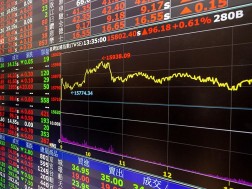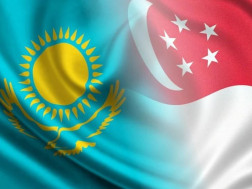Africa is not a country and Zambia is an opportunity. While U.S president Trump proclaimed liberation day for the US economy by imposing unprecedented tariffs, global and smart investors might focus on AFRICA re-imagined.
There are many reasons why will play a bigger role in the global economy & global investment portfolios. Africa is home to 30% of the world’s known mineral reserves and 60% of the world's uncultivated arable Land. “Tech leapfrogging” has made Africa the dominant mobile money market, with 66% of global transaction value, and the world’s fastest growing smartphone market, despite still having some of the world's lowest penetration rates. Telcom stock AIRTEL networks Zambia share price on the LuSE Lusaka stock exchange has appreciated by over +100% year-to-date.
India and China and their equity markets have graduated from the dark alleys of EM emerging markets and have become mainstream. African equity markets on the other hand however are still mostly overlooked and under researched and hence less correlated with western or mainstream markets. This creates an opportunity for patient and long-term capital.
While global investors are concerned about trump tariffs and possible risk of lower economic growth if not recession in the USA and the S&P 500 index targets are being lowered by global banks like Switzerland’s UBS, Ghana in Africa is the world’s best performing stock market. Ghana trades at a P/E of 6x and a dividend yield of 2.92%, in US dollar terms as of Friday April 4th, the U.S market is down – 13.7% YTD year-to-date the Ghana market is up and + 23.9% return in U.S. dollar terms. This shows the global diversification benefit of adding African stock markets to a globally diversified investment portfolio.
In a world where traditional investment destinations are becoming increasingly saturated and competitive, savvy investors are turning their eyes toward frontier markets—especially those in Africa. Among them, Zambia stands out as a market brimming with untapped potential, ripe for long-term growth.
Zambia, a key player in Southern Africa’s economic landscape, presents a compelling investment case for equity investors seeking exposure to emerging frontier markets. With its abundant natural resources, strategic economic reforms, and a growing consumer base, Zambia offers numerous opportunities for long-term value investors.
African economies, though often overlooked, are among the fastest-growing globally. Zambia, for instance, is strategically located in the heart of southern Africa, rich in natural resources like copper, cobalt, and emeralds. While the country has faced economic headwinds in the past, recent reforms and a renewed focus on diversification are paving the way for recovery and expansion.
The Lusaka Securities Exchange (LuSE) might be small in terms of listed companies but therein lies the opportunity. Early investors can benefit from the initial phases of market liberalization, expansion, and eventual inflows from global funds as the market gains visibility.
Many African stocks, including those in Zambia, trade at a discount relative to their fundamentals. Low P/E ratios, high dividend yields, and strong balance sheets are common among listed companies. For value investors, this is a dream: buying good businesses at cheap prices.
For instance, Zambian Breweries and Zambia Sugar have consistently shown resilience and profitability yet often trade below book value due to limited foreign investor awareness or low liquidity. As more investors enter the market, valuations could re-rate upward—providing substantial capital gains.
Economic Outlook and Growth Potential
Zambia's economy has demonstrated resilience despite global and regional challenges. The country’s GDP growth is projected to rebound, driven by improved macroeconomic policies, infrastructure development, and growing foreign direct investment (FDI). The recent debt restructuring deal with international creditors has improved fiscal stability, restoring investor confidence in Zambia’s economic trajectory. Bloomberg expects over 5% GDP growth for 2026 & 2027.
Zambia has made strides in improving transparency and governance. The government is actively working with the IMF, restructuring debt, and boosting investor confidence. Regulatory bodies like the Securities and Exchange Commission of Zambia have also enhanced investor protection measures, bringing credibility to the local market.
Zambia is part of a broader African trend of digital leapfrogging. Fintech, mobile money, and digital banking are growing rapidly, even in rural areas. This tech adoption is not only expanding financial inclusion but also driving profitability in sectors like banking and insurance—again, opportunities visible in listed equities.
Key Sectors Driving Equity Market Growth
Mining and Natural Resources: Zambia is Africa’s second-largest copper producer, making the mining sector a critical driver of economic growth. The government’s policies to attract investment in the sector, coupled with rising global demand for copper (especially for renewable energy and electric vehicles), make mining stocks attractive. CEC Copperbelt Energy Corporation Plc (CEC) is a Zambian electricity generation, transmission, distribution and supply company with operations in Zambia and Nigeria.
Banking and Financial Services: Zambia's financial sector has seen rapid growth, with increasing penetration of banking and fintech services. Regulatory improvements and digital transformation are positioning banks and financial service providers for sustained profitability.
Consumer and Retail: With a young and growing population, the demand for consumer goods, retail services, and telecommunications is expanding. Companies in these sectors are benefiting from urbanization and rising disposable incomes.
Agriculture: Zambia has vast arable land and water resources, making agriculture a significant contributor to economic diversification. Investments in commercial farming, agribusiness, and food processing offer strong potential for long-term equity returns.
Stock Market Performance and Opportunities
The Lusaka Securities Exchange (LuSE) provides a platform for equity investments, with notable companies listed across key sectors. While liquidity remains a challenge, increasing institutional participation and foreign investment inflows are improving market depth.
Several blue-chip stocks on the LuSE offer stable dividend yields and growth potential, making them attractive for value and income investors. Additionally, government initiatives aimed at enhancing capital market participation are expected to boost investor sentiment. The Zambia capital markets.
Zambia Capital Markets Master Plan (CMMP).
The Zambia Government under the auspices of the Ministry of Finance and National Planning (MoFNP) and the Securities and Exchange Commission (SEC) spearheaded.
The development of the Capital Markets Master Plan (CMMP). The CMMP is a ten-year long term strategy for capital market development in Zambia. Its objective is to provide a framework for Zambia’s capital market development over a period of ten years.
Zanaco bank of Zambia
Since listing in 2008 ZANACO has and retained its position as the largest bank in Zambia with over 5 million customers and market shares of 31%, 31% and 34% for total assets, deposits and loans respectively. With a solid balance sheet and impeccable asset quality, the bank’s profitability ratios remain top quartile with a RoE of 40.8% for FY2023. Valuations are full, however as the blue. chip on the LuSE, the current P/E of 4.46x is attractive for value investors.
As the market leader in a banking sector characterised by stiff competition from South African and Nigerian banks, Zanaco continued to outperform and commands roughly a third of the Zambian banking sector. The bank pays a dividend yield of 8%.
The Lusaka Securities Exchange (LuSE), established in 1993 with support from the International Finance Corporation and the World Bank, serves as Zambia's primary stock exchange. It offers a platform for trading a diverse range of securities, including equities, fixed income instruments, and exchange-traded funds. As of November 2024, LuSE had 20 listed companies with a market capitalization of ZMW 216.4 billion (approximately US$8.3 billion). The exchange operates a two-tier market structure, comprising the Official List for formally listed companies and a secondary tier for quoted shares. LuSE is a member of the African Securities Exchanges Association, reflecting its integration into the broader African capital markets.
Risks and Considerations
Investing in Zambia's equities comes with inherent risks, including:
Currency fluctuations: The Zambian Kwacha has been volatile, impacting returns for foreign investors.
Regulatory risks: Changes in government policies and taxation can influence corporate profitability.
Market liquidity: The LuSE is relatively small compared to global markets, which may pose liquidity challenges for larger investors.
Conclusion
Investing in Zambia—and Africa more broadly—is not just about chasing alpha. It’s about being early in the story of a continent that is rich in resources, talent, and potential. For investors with patience, vision, and a stomach for volatility, the rewards could be substantial.
Zambia's equity market presents a unique opportunity for investors willing to take on emerging market risks in exchange for high-growth potential. With structural economic reforms and a capital markets master plan, a thriving mining sector, and expanding consumer markets, Zambia’s equities offer strong prospects for value-oriented and long-term investors. Strategic investments in well-positioned companies across key industries can yield attractive returns in the coming years.
Disclaimer
The information provided in this article is for general informational purposes only and does not constitute financial, investment, or other professional advice. Investing in Zambian equities—or any frontier or emerging market—carries inherent risks, including but not limited to market volatility, currency fluctuations, political and economic instability, low liquidity, and limited financial disclosure by some companies.
Before putting your money into Zambian equities (or any market), make sure you do your homework. It’s a good idea to talk to a financial advisor who understands these markets and can help you figure out what’s right for your goals and risk tolerance.
Rainer Michael Preiss, Partner & Portfolio Strategist at Das Family Office in Singapore























